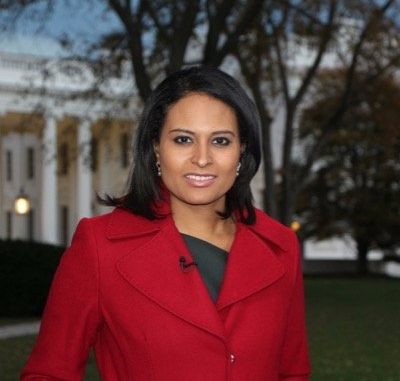

NBC’s Kristen Welker maintains order for final presidential debate
As always, the “winner” of Thursday’s debate will be largely a matter of partisan opinion. The undisputed winner was journalism. After too many missteps in the Trump era when the media has fallen short of past standards, Welker did a good job of returning some respect to the profession.
The debate Thursday night between President Trump and former vice president Joe Biden was so substantive and informative it sometimes bordered on boring, reflecting a level of gravitas we need more of in politics today.
Trump, of course, can be counted on to bring at least a minimum level of bombast. He has a knack for enlivening things even when it seems safe to nod off. He was determined to inject into this nationwide broadcast claims about the business dealings of Hunter Biden, including allegations that the elder Biden was aware of — and involved in — his son’s business dealings (something Joe Biden has denied).
Whether Trump laid a glove on Biden isn’t yet clear, but it was to moderator Kristen Welker’s credit that, even if she didn’t invoke Hunter Biden herself, she also didn’t try to stop Trump from doing so. Biden responded mostly by trying to change the subject to Trump’s foreign dealings. Eventually, Biden will need to answer in more detail questions about his son’s foreign business arrangements, and his attempt to blame Russia for these allegations is all but certain to seem obviously nonsensical.
Over an hour and a half, the debate also covered the pandemic, health care in general, foreign business dealings, the economy, immigration, race relations, climate change, energy and leadership. Viewers were able to hear the stark and substantial differences between the candidates.
On the more than 500 children separated from their parents at the border, Biden did a good job making the emotional case for the tragedy of such circumstances. But Trump was effective in explaining efforts being made to reunite children and parents and the care that children are receiving in the meantime. And when Trump charged that the Obama administration initially supplied the notorious “cages” that housed children, Biden never answered Trump’s repeated question: “Who built the cages, Joe?”
On how governors have handled covid-19, Biden scored with his comment that he doesn’t look at states “in the way [Trump] does, blue states, red states,” saying that to him, “they’re all the United States.” Trump’s upbeat outlook on covid-19 may strike some as too rosy, but it stood in contrast to Biden’s “dark winter” and suggestion that Americans are learning not to live with the virus but “to die with it.” Voters tend to prefer optimism to defeatism. And Biden’s late-in-the-game admission, under pressure from Trump, that he would transition the country away from the oil industry might haunt him.
Trump was good Thursday evening, and probably not just because of the debate sponsors’ decision to mute microphones if necessary to allow for uninterrupted answers. The president took a different approach to this debate than he did to the first one, which was a disaster for him. Trump’s performance Thursday encapsulated what makes him frustrating for those who want him to succeed. This is the version of Trump many of his supporters want to see more often — smart, informed and even presidential. Sadly, he doesn’t show up often enough.
As moderator, NBC’s Welker offered a master class in handling the two candidates. It stood in sharp contrast to last week’s examples of what not to do at the competing town halls that replaced the canceled second debate.
Last week, Trump was aggressively — some might say rudely — grilled by NBC’s Savannah Guthrie, who turned what was intended to be an audience-driven event into a one-on-one debate. Bizarrely, Guthrie spent an inordinate amount of time pressing Trump on QAnon, a fringe conspiracy movement most Americans aren’t focused on as an election issue. In the event’s opening minutes, she also demanded that Trump denounce white-supremacy groups, a favorite media topic no matter how many times Trump repudiates them.
On ABC, meanwhile, Biden was treated like an old friend dropping by for drinks. Moderator George Stephanopoulos never broached reporting in the New York Post and other outlets on emails purportedly obtained from a laptop belonging to Hunter Biden. Stephanopoulos only mildly pressed Biden on whether he would pack the Supreme Court, settling for a “noncommittal committal” that Biden would answer the question before Election Day — depending on how the Amy Coney Barrett nomination turned out.
These set the stage for how Welker would moderate Thursday’s face-off. She was respectful and tough in equal measure for both candidates, allowing them to make their points but always returning to the topics she wanted addressed. Focusing on the agenda, she put both candidates on the spot. For instance, she hit Trump hard on the allegations of racism frequently leveled against him, but she also pressed Biden on negative consequences of the 1994 crime bill he oversaw as chairman of the Senate Judiciary Committee. And so it went throughout the night, fair and balanced.
As always, the “winner” of Thursday’s debate will be largely a matter of partisan opinion. The undisputed winner was journalism. After too many missteps in the Trump era when the media has fallen short of past standards, Welker did a good job of returning some respect to the profession.
(Gary Abernathy is contributing Columnist with Washington Post)
(Source: Washington Post)





Be the first to comment